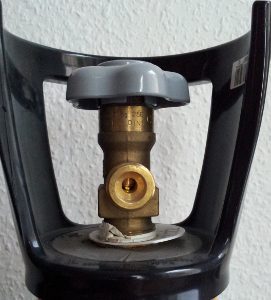GAS BOTTLE
Where can I get a CO2 gas cylinder?
- Internet mail order, gas distributors, hardware store or Drinks Wholesale store
Make sure that you purchase a property free bottle without logo imprint. These bottles are accepted by most local traders later for exchange and can therefore will not be problematic when introduced into the bottle deposit system.
The mail order business is priced better for initial purchase of the gas cylinders against the local trade.
The fillings rates are usually consistent in the local trade.
What sizes, designs and differences are available in CO2 gas cylinders?
The gas cylinders are available in sizes of 10, 20, 30 to 50kg of CO2 Content.
Each bottle size is available with or without a dip tube(syphon tube) valve.
Only in the 10 KG (20-22 lbs), there are also two different designs of the body of the bottle. One as “short compact design” with handle and the other, a “long and narrow head”.
The 10 KG (20-22 lbs) bottles are available with the following Versions:
- high version (long) “without a dip tube valve”
- high version (long) “with a dip tube valve”
- short version (compact with handle) “without a dip tube valve” (optimal)
- short version (compact with handle) “with a dip tube valve” (optimal)
The 10KG (20-22 lbs) bottle long version will soon be expelled from the bottle exchange system. Therefore, always select the short version of the 10KG (20-22 lbs) bottles. These bottles will be accepted in the future everywhere.
For physical reasons, the filling of the cylinder with small gas cylinders (eg. 2 KG [4-5 lbs] content) is not possible.
You need at least a gas cylinder with 6KG [14-15 lbs] CO2 content.
Optimal is a gas cylinder with 10KG [20-22 lbs] CO2 content. (most economical)
In bottle sizes from 20KG capacity, the gas cylinder should be used in a dip tube (syphon tube) design due to size and weight. (Or alternatively retrofitted to existing bottle from your gas trader with a dip tube valve).
What makes gas cylinders vary with dip tube valve / without dip tube valve?
- When transferring the CO2 adapter the difference is in the “comfort”.
- For bottles with a dip tube valve, necessary for transferring liquid CO2 is removed standing upright on the floor.
- For gas cylinders without a dip tube valve must be turned upside down or 180 degrees for the removal of the liquid carbon dioxide.
How can I tell a CO2 cylinder with a syphon tube valve / dip tube?
Gas bottle with a syphon tube are usually marked with an additional label stating the type of valve.
Partly symbolizes a vertical color line in addition the so-called “dip tube”.
Conventional bottle without a dip tube valve which are used, for example in dispensers have no indication / label for Valve.
Since both the bottle bodies are identical from the outside, a mistake During operation will be excluded “in dispensers”.
(Dispensers require gaseous CO2.)
Which gas cartridge and design is optimal?

Basically, each 10KG (20-22 lbs) gas cylinder is optimal and sufficient even without a dip tube/ syphon tube valve in a short version with carrying handle.
The short and compact cylinders with carrying handle are easy to transport and the fillings are the most favorable for a wide variety of bottles.
Advantages and disadvantages of the possible Versions:
- The difference is in the “comfort”. Gas bottle without a dip tube must be rotated on the head during filling. The bottles are slightly cheaper to buy and you can swap them anywhere since they are also used in the catering trade (in dispensers) and are therefore common.
- The gas cylinders with syphon tube must not be rotated and are therefore more practical. However you get them only from gas distributors. The bottles are slightly more expensive to buy.
They achieve with and without a dip tube valve an identical filling result.
Where can I fill my large gas bottle?
- Gas bottles are usually not directly filled by the gas distributors, but only exchanged.
- You get a completed and identical bottle, usually with up to date TÜV certification in exchange for your empty gas bottle.
- Occasionally there are also gas distributors in some regions who will fill your bottle directly but that is the exception.
- Gas cylinders can therefore be unproblematic when exchanged at the hardware store or major beverage Distributors.
How much does the re-filling / replacement of large gas bottle cost?
Prices vary regionally and are between 20-25 € (e.g., USA $25-27) for a 10KG (22 lbs) CO2 filling.
Can gas cylinders also be rented / borrowed?
Yes, however, as a rule the price is quite high at the well-known brands.
In addition, these rented bottles will not be accepted from “free” gas traders for exchange or filling,so besides the high rent, you have neither the option to refill the bottle at the cheapest gas trader or exchange.
Should the gas cylinders TÜV be checked?
The large gas cylinders must be tested every 10 years.
Usually a small label on the bottle shows the date of the next TÜV examination.
Occassionaly the last and / or next test date is directly on the bottle, neck in the metal.
If you swap your bottle, then get a bottle with a new or slightly older valid TÜV certification, you do not have much to do with the topic TÜV.
Should the gas bottle be kept permanently "upside down"?
No. The gas cylinder should be stored standing normally again after the filling process.
Should I check the conections of the Gas Cylinder before?
No. In Germany, Europe and most countries the intake at CO2 gas cylinders is standardized with a gas right thread.
The CO2 adapter is also tuned to this port.
